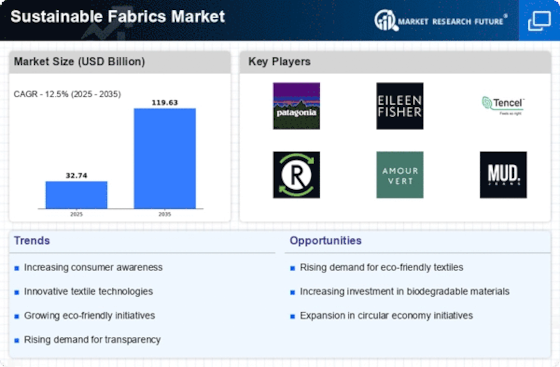Top Industry Leaders in the Sustainable Fabrics Market
 The sustainable fabrics market is a burgeoning landscape, experiencing explosive growth fueled by rising environmental awareness and evolving consumer preferences. But navigating this dynamic territory requires understanding the intricate web of competition, strategies, and news shaping its future.
The sustainable fabrics market is a burgeoning landscape, experiencing explosive growth fueled by rising environmental awareness and evolving consumer preferences. But navigating this dynamic territory requires understanding the intricate web of competition, strategies, and news shaping its future.
Strategies Adopted by Eco-Conscious Fabrics Champions:
-
Embracing Material Diversity: Players like Patagonia and Eileen Fisher are expanding their offerings beyond organic cotton, exploring innovative fibers like Tencel Lyocell, recycled polyester, and even bio-based options like mushroom leather. -
Circular Economy Champions: Companies like Adidas and Stella McCartney are pioneering closed-loop systems, investing in garment recycling technologies and incorporating recycled materials into new products. -
Transparency and Traceability: Sustainability isn't just about materials; it's about ethical practices. Brands like Everlane and Reformation are prioritizing transparency in their supply chains, showcasing ethical sourcing and production processes. -
Technological Advancements: From bio-fabrication to nanotechnology, companies like Evrnu and Pajar are investing in R&D to develop next-generation sustainable fabrics with enhanced performance and reduced environmental impact. -
Sustainable Partnerships: Collaboration is key. Companies like Levi Strauss & Co. are partnering with NGOs and research institutions to address critical challenges like water usage reduction and microplastic pollution.
Factors Shaping Market Share:
-
Brand Reputation: Established brands with a proven track record of sustainability, like Patagonia and The North Face, command trust and attract environmentally conscious consumers. -
Innovation and Performance: Offering high-performance, durable fabrics made from sustainable materials like Tencel or recycled nylon gives players like Arc'teryx and Outdoor Research an edge. -
Accessibility and Price Point: Making sustainable fabrics affordable and accessible to a wider audience is crucial. Companies like H&M and Zara are playing a key role in democratizing sustainable fashion. -
Transparency and Storytelling: Consumers demand honesty and authenticity. Brands that transparently share their sustainability journey and impact stories, like Eileen Fisher and Reformation, resonate with eco-conscious buyers. -
Regulatory Landscape: Increasing regulations on synthetic fiber use and wastewater discharge incentivize the use of sustainable fabrics, benefiting companies with strong eco-footprints.
Key Companies in the Sustainable Fabrics market include
- Grasim
- Vivify Textiles
- Foss Performance Materials
- Teijin Limited
- US Fibers
- Pure Waste Textiles Ltd
- Polyfibre Industries
- Wellman Advanced Materials
- Textil Santanderina
- Pilipinas Ecofiber Corp
Recent Developments
October 2023: Major fashion brands commit to ambitious sustainability goals, including eliminating single-use plastics and using 100% recycled or organic cotton by 2030.
November 2023: Despite holiday season slowdowns, the sustainable fabrics market witnesses sustained growth, driven by increasing consumer awareness and a shift towards conscious purchasing.
December 2023: Rising cotton prices and concerns about water scarcity further highlight the potential of water-efficient and recycled fabrics, benefiting companies like Evrnu and Lenzing.










